The first weekend in September was Labour Day so a Monday off for Jon. We drove over to Alexandria in Virginia to visit Hilton and Suzy in their home. It was good to catch up and hear about their experiences at the carnival in Trinidad. Coming home they had done the offshore route using the Gulf Stream , only popping into the ICW a couple of times. We went out for a pizza meal in town. Then we saw Mayflower in her marina berth.
“Take a look at this,” Hilton said showing us a recent copy of Wooden Boat magazine.
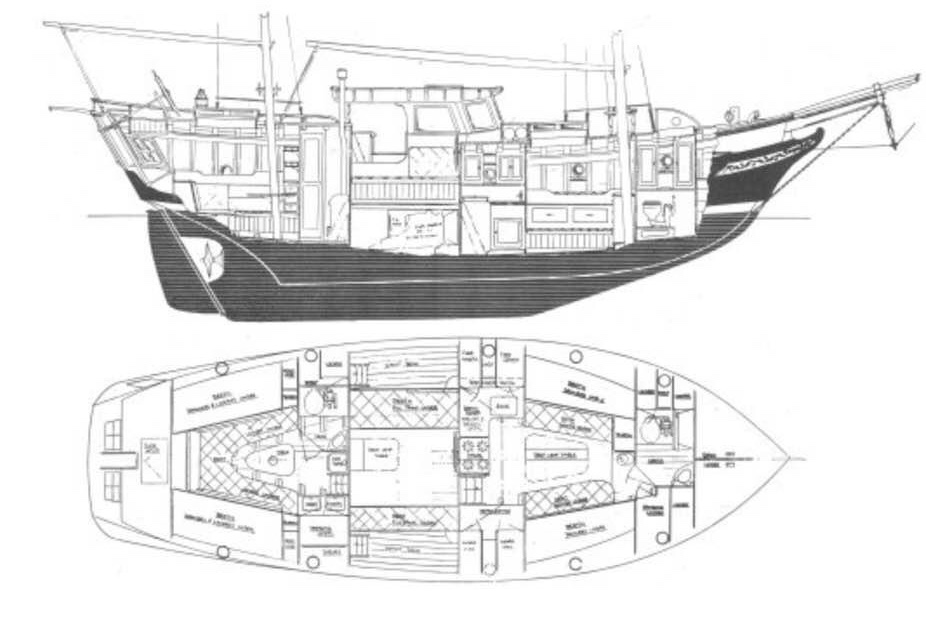
Circled was an advertisement for a Mayflower 40 for sale in Maine. She was called Three Bells. The asking price was $97,500. Still in the original ownership for over twenty years, they had made some modifications including losing the well decks to make them flush with the foredeck. This created extra locker space accessible from the cockpit. They had also built a bulkhead between the galley and the saloon.
“That is very encouraging,” said Jon. “Can I keep this?”
“Sure, you should leave it lying open when folk come looking,” replied Hilton. “And when you do haul out, give me a few days notice and I’ll give you a hand.”
I took the boys into a barbers shop for a much needed haircut. They came out with military style crewcuts, which was more severe than I had wanted but they were both very pleased and called each other “Loo-tenant!” Accompanied by a smart salutes. The scar on Olivers forehead was hardly noticeable.
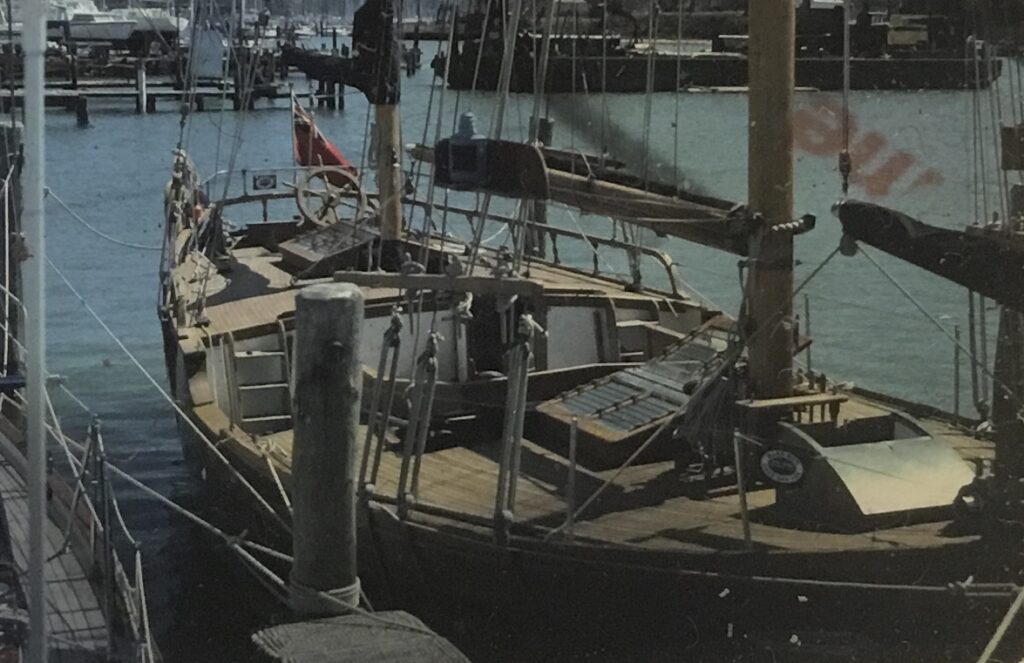
We invited Kate and her son Chuck for a daysail up the Severn River on Labour Day. It was quite beautiful. Kate was rather wistful about enjoying that day out under sail. She admitted she was suffering from several chronic conditions which meant she did not feel safe away from medical help. Nevertheless we all enjoyed that late summer on the water surrounded by steep hillsides with magnificent forests called Sherwood and Epping Forest. Unbeknown to me at that time, that was the last time the boys and myself would ever sail on Camelot.
Jethro learns a new language
The need to get Jethro into school was our next priority. The new school year was just starting in England. We decided I should return to the UK with the boys and leave Jon to get Camelot restored to her former glory with the help of friends happy to help. There was ample room for both boys and myself at my parent’s house. Within easy walking distance was a good infant school, and nearby a play school which Oliver could attend three mornings a week.
We left from Dulles on a direct flight to Manchester airport, only five miles from my family. Jethro started at the local school and had to adapt to an environment where he did not speak the dialect and knew nothing about football. This he managed to accomplish very quickly. I collected him from the playground after the first day and he beamed happily,
“Mummy, I’ve learned a new language!” He said proudly… “Hello is ‘aye ya,’ and Goodbye is ‘ta rah’… at this rate he’d be getting a part in Coronation Street before long.
Oliver enjoyed play school, but had no immunity from any of the infections he met. He suffered a constant series of colds which meant he needed an operation to insert grommets in his ears. It was good to spend time with my old friends and our huge extended family. His uncle and older cousins took Jethro to a Manchester City football match. Learning to fit in with any community is a very useful life skill.
Meanwhile in Annapolis Jon carried on working at Hoods and paid the import duty. With the help of friends and their power tools he restored Camelot to her former glory.
A journalist from the National Geographic magazine was taken out into the Chesapeake Bay for sale trials and agreed to pay the full asking price. There were three other interested parties which helped. We were extremely fortunate that the exchange rate worked in our favour. When we bought Camelot in March 1980 the rate was 2.4 US dollars to the pound. When we sold in in 1984 it was 1.6 dollars to one pound sterling.
Exchange rates
This reminded me that before decimalisation in the UK in the early 1970’s we had a coin worth 2 shillings and sixpence called a half crown. There were eight of these to one pound. It was nicknamed half a dollar. So presumably there had been four dollars to one pound sterling at one time.
New life in Salcombe and Yawl sailing
Consequently we were able to buy a house in Devon, and for Jon to equip a new sail loft on which he took out a lease in Salcombe. There was even enough left in the piggy bank for Jon to buy an old Salcombe Yawl, Curlew Y25, from the Island Cruising Club and to join in the round-the-estuary-marks racing to give the locals some competition.
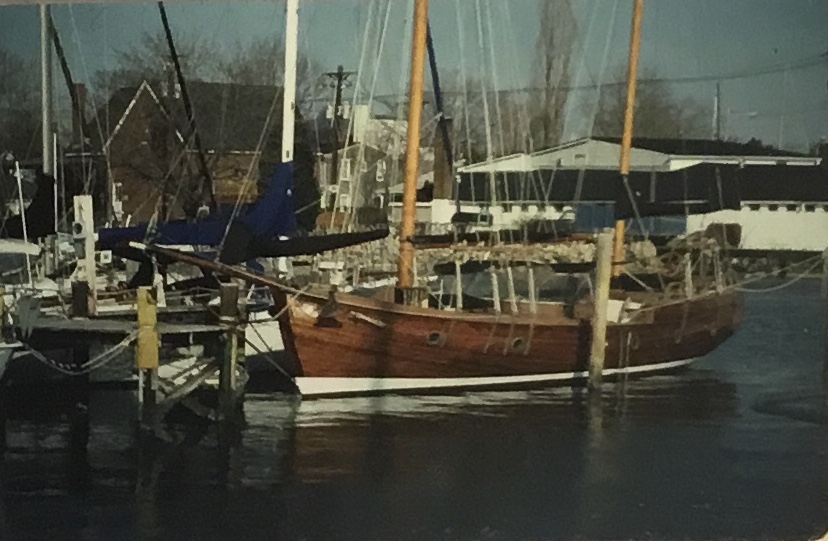
Conclusions
There are many conclusions to be drawn from that whole experience. Firstly, I am very grateful that we had the opportunity to travel so extensively whilst we were both young enough and fit enough to benefit from the ups and downs of living afloat. So many people plan to do extensive cruising when they retire, we met a lot of them. Many more do not live long enough or do not have the health and agility to cope, rather like Kate. Sadly, Kate died before her sixtieth birthday.
Secondly, the nay-sayers told us at the time we were being unfair to take young children on a floating gypsy way of life. They said we were wrong to deprive them of friends and family and the community where they belonged. On the contrary, I believe they both benefitted from the experience. Not least was their ability to befriend the newcomers in their lives, having been that newcomer themselves so often at a young age. Also they gained the confidence to feel comfortable with people of all ages, nationalities and ethnic backgrounds.
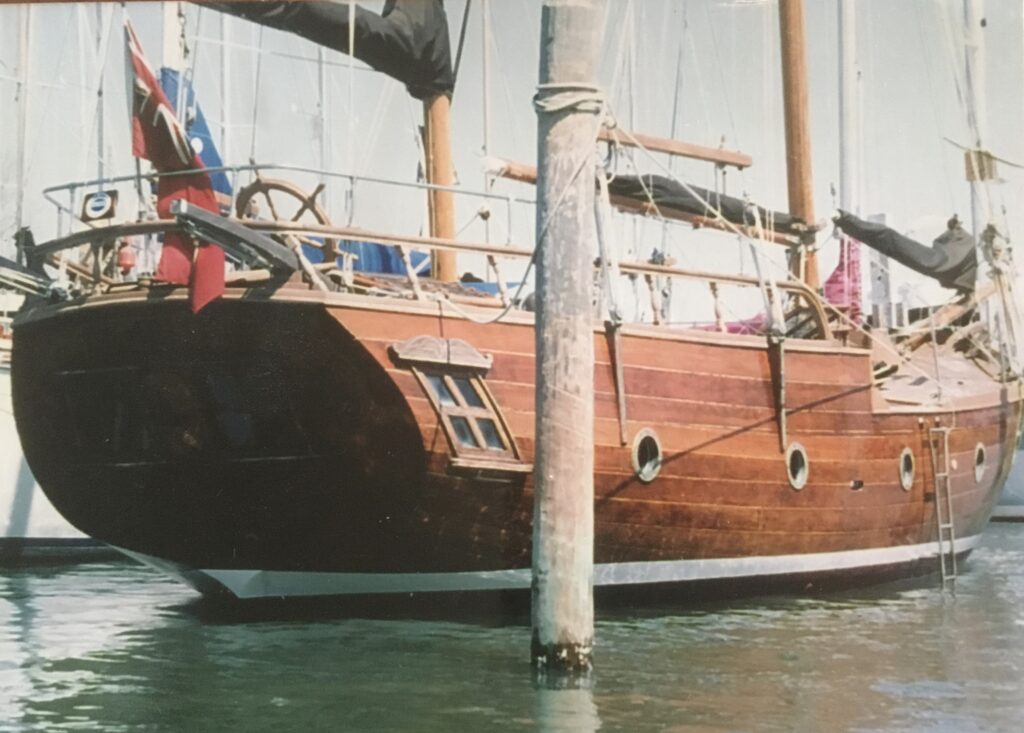
Thirdly, in reading through my letters home I am flabbergasted at how much time was spent just trying to make a phone call in the early 1980’s! And often, after making the effort and paying in advance for a three minute connection, there would be no reply or the recipient spent all the time asking you what time it was! Life before the advent of mobile phones and satellite connections was very different.
Fourthly, Credit Cards or Debit cards were not widely accepted then. Waiting for bank transfers was very time consuming. We had Barclaycards from the UK, had bank accounts in both England and Tortola that were in credit but our cards were laughed at by folk selling fuel and groceries. American Express cards were more widely accepted in the USA, but not universally.
Lastly, how much easier navigation is these days! With GPS waypoints and charts on I-pads, paper charts and dividers seem to be rare on many boats today. Even on ocean passages nowadays you do not see people using sextants and studying tables.
There is a saying that “The two happiest days of a sailor’s life are the day you buy your boat and the day you sell it.” I can vouch for that.
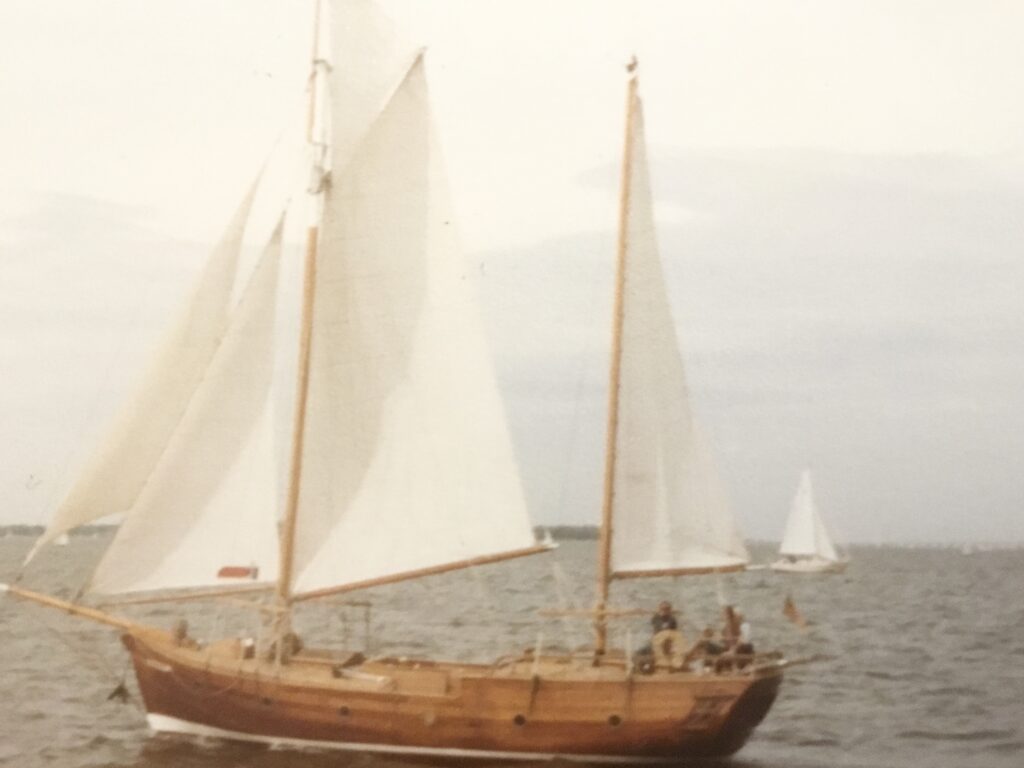
Comments
2 responses to “34). Camelot Sold at last”
What a fabulous read Sue, such memories …
Are you in the UK or BVI now?
I’m living in Salcombe these days but do get over to visit Olly in the BVI most winters. I was there when COVID closed down the airport in 2001 and had to stay for over six months… tough, eh?
Sue x.